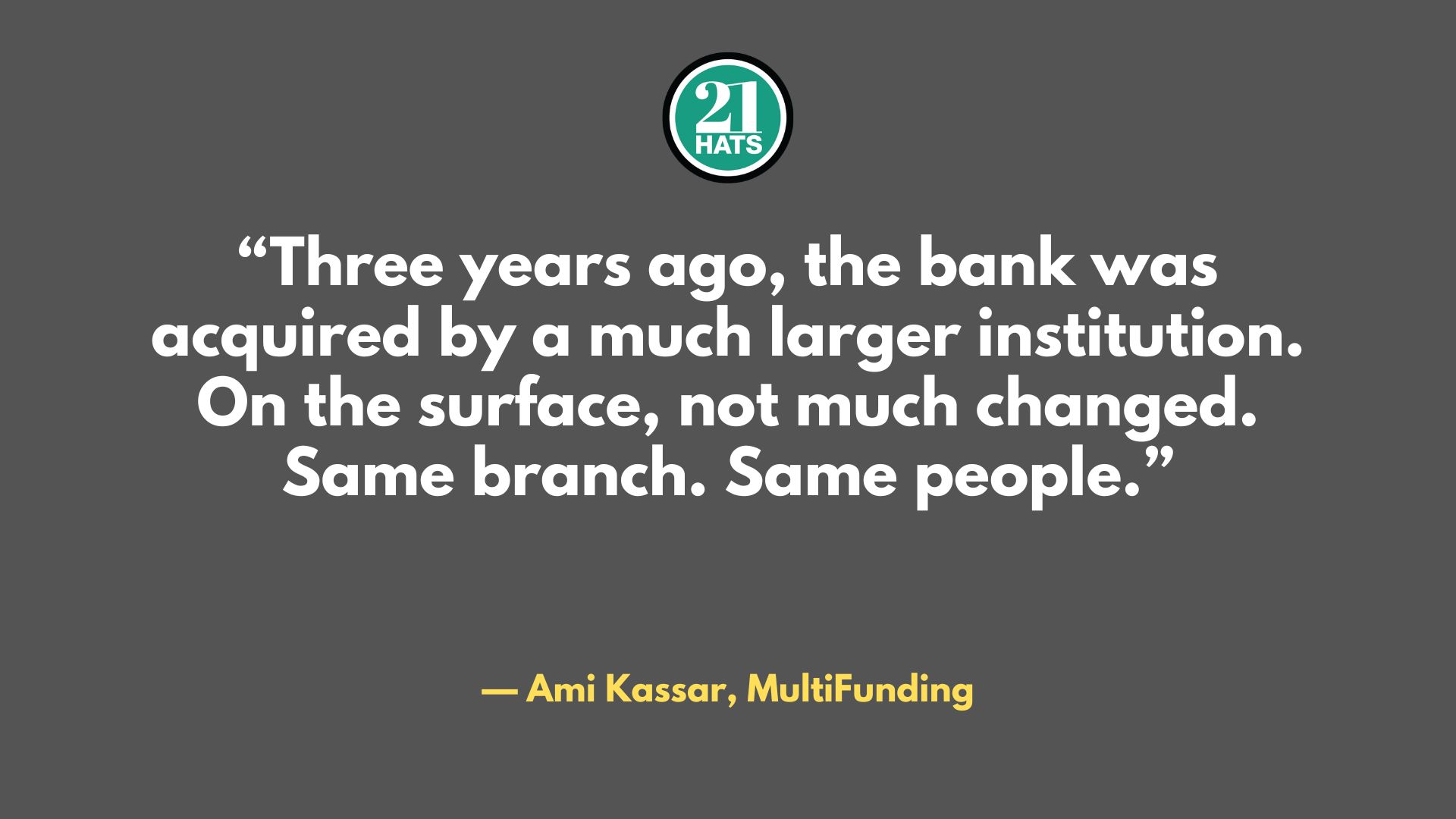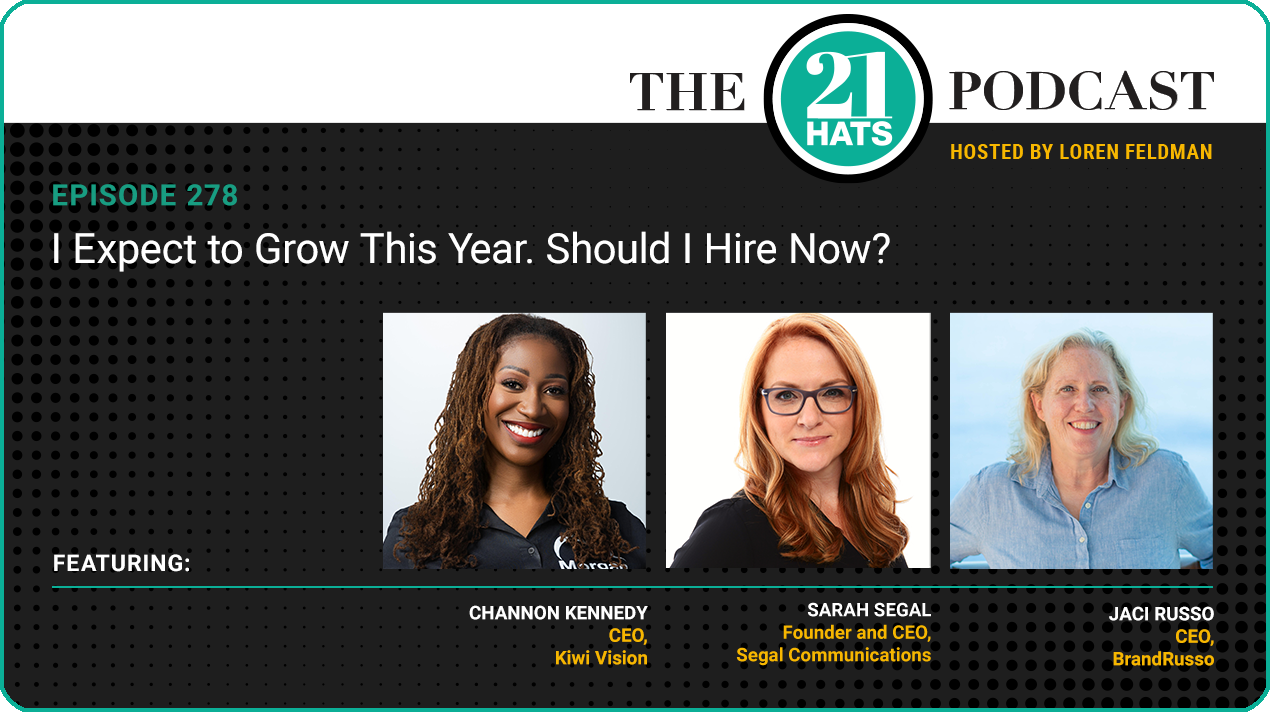
Large banks operate through policies, processes, and committees, and once fatigue sets in, relationships rarely reset.
The fourth annual 21 Hats Live will take place in Cincinnati in May. It's a rare opportunity to connect with other owners who understand what it takes to build a business.
Have you read our testimonials? At 21 Hats, don't tell you how to run your business. But we do publish news articles, Q&As, webinars, podcasts about what it takes to build a business.
The model, which tracks a diverse set of entrepreneurial businesses, indicates companies with less than $10 million in revenue are growing at less than 1 percent a year.

Things are suddenly moving fast at Sarah Segal’s San Francisco PR firm. Several new clients look likely to sign on, and for the first time in a while, growth feels real. Which leaves Sarah with a familiar, nerve-racking question: Do you hire before the work arrives—or wait until the revenue is actually in the door? If she hires now, she may have to cut her own pay until the new business materializes. And there’s no guarantee it will. She still remembers the last downturn, when she had to lay off people she cared about—and she’s determined not to repeat that experience. But if she waits and the clients do sign, she risks something else: overloading her existing team, burning people out, and falling behind before she can recruit and train new hires. The pressure is even higher because Sarah has already set an aggressive revenue goal for 2026.
Plus: Jaci Russo explains why she’s adopted a different approach to planning and budgeting. Instead of guessing how much she can afford to spend, Jaci is changing the order of the math. After revisiting Mike Michalowicz’s Profit First—prompted by a story highlighted in the 21 Hats Morning Report—she’s begun setting profit targets first and forcing every other decision, including hiring, to fit around them. It’s only been a few weeks, but Jaci says the shift is already changing how she thinks about risk, growth, and what she can actually afford.
This week, special guest David Barnett, who started helping owners buy and sell businesses in 2008, offers some guidance on an often-misunderstood sales process. Early on, David was a business broker. “I sold over three dozen companies for other people,” he tells us, “and it was very interesting and exciting. It was also a terrible business.” So he changed business models but has continued to do pretty much the same work. As a result, he’s amassed a lot of first-hand knowledge, much of which he shares in our conversation, including: why many owners fail to think of their business as an asset, why sellers shouldn’t be too quick to reject earnouts, why buyers should consider making multiple offers for the same business, how buyers can protect against the post-purchase loss of important customers, why businesses are selling for less than they were a couple of years ago, why there may be a smarter way to buy a business than by scouring business-for-sale websites, and why there really isn’t a true market for buying and selling small businesses.
This week, we bring you another 21 Hats Brainstorm. Elan Daniel, who started a small-batch hummus business inspired by a memorable experience in Israel, is trying to figure out his best path to long-term viability. So far, he’s been selling at farmers markets and direct to consumers, making all of the hummus and all of the deliveries himself. Since February, his sales have been growing between 5 and 10 percent a week, but his growth is constrained by his refusal to use preservatives, which adds flavor but limits the product’s shelf life. So how should he proceed: Should he sell to speciality markets and restaurants? Should he try to sell to Whole Foods? Should he open his own hummus restaurant, or hum-oo-sia? Should he try to introduce his hummus to the uninitiated or should he focus on connoisseurs? To help Elan think through his options, we convened a panel of 21 Hats Brainstormers and recorded this podcast episode. It’s brought to you by New Bridge Studios, which helps companies, creators, and causes connect their story to the bottom line. And by the way, if you have a challenge you’d like to put before a panel of business owners in our next Brainstorm, shoot me an email: loren@21hats.com.
A few months ago, John Abrams—author of From Founder to Future—joined us to talk about succession strategies and the different ways business owners can share ownership with employees. For his own business, John chose one of the more radical options: he turned his construction firm into a worker cooperative. Perhaps surprisingly, the more he described the co-op model, the more intrigued Jay Goltz became—although, predictably, Jay did retain a degree of skepticism. So we asked John to come back on the podcast to help Jay dig a little deeper: Are co-ops really all about democracy? Does someone on the loading dock get the same vote as the CEO? How do profits get split in the co-op model? How do losses get absorbed? How are loans secured without burdening frontline workers with personal guarantees? And perhaps most important: What can go wrong? In the end, I think surprising even himself, Jay failed to identify any real dealbreakers.
For many, knitting may still conjure an image of a grandmother in a rocking chair, her cats sleeping and her doilies taking shape. In recent years, however, the quiet industry of tiny neighborhood yarn shops scattered across the U.S. has become an unlikely cultural battleground. It’s been divided by charges of racism and cultural appropriation that have erupted in a series of social media firestorms, prompting some owners to close, sell, or rebrand their businesses. It may seem surprising that such a quiet pursuit could produce so much conflict, but it’s really not all that different from the fissures afflicting the country as a whole. In this conversation, we meet three women who were not content to stick to their knitting: Adella Colvin, whose business, LolaBean Yarn Co., is a prominent independent dyer based in Grovetown, Ga.; Gaye “GG” Glasspie, a leading yarn industry influencer whose signature color is orange and who is based in Clifton, N.J.; and Felicia Eve, who owns String Thing Studio in Brooklyn, N.Y., one of the few Black-owned yarn shops in the country. The video offers our entire conversation. You can also listen to a slightly edited 21 Hats Podcast version of the conversation wherever you get podcasts.
It’s not always about marketing. Sometimes, the real issues go deeper. Sometimes, before you can figure out how to sell, you have to figure out who you are.
For many, knitting may still conjure an image of a grandmother in a rocking chair, her cats sleeping and her doilies taking shape. In recent years, however, the quiet industry of tiny neighborhood yarn shops scattered across the U.S. has become an unlikely cultural battleground. It’s been divided by charges of racism and cultural appropriation that have erupted in a series of social media firestorms, prompting some owners to close, sell, or rebrand their businesses. It may seem surprising that such a quiet pursuit could produce so much conflict, but it’s really not all that different from the fissures afflicting the country as a whole. In this conversation, we meet three women who were not content to stick to their knitting: Adella Colvin, whose business, LolaBean Yarn Co., is a prominent independent dyer based in Grovetown, Ga.; Gaye “GG” Glasspie, a leading yarn industry influencer whose signature color is orange and who is based in Clifton, N.J.; and Felicia Eve, who owns String Thing Studio in Brooklyn, N.Y., one of the few Black-owned yarn shops in the country. The video offers our entire conversation. You can also listen to a slightly edited 21 Hats Podcast version of the conversation wherever you get podcasts.
This week, we talk to two people who walked away from promising careers to buy blue collar businesses. Long before search funds and sweaty startups became all the rage, Bob Schwartz left a Wall Street investment banking career to buy a chain of laundromats, SuperSuds, which operates in Delaware, Maryland, Pennsylvania, and Virginia. More recently, Mills Snell left a prominent private equity firm to buy a roofing contractor, Aqua Seal Manufacturing and Roofing, which is based in Columbia, South Carolina. In this conversation, Schwartz and Snell talk about what they were thinking, what they learned about buying a business, what they’ve learned about operating a business, and whether they’re looking for an exit.



